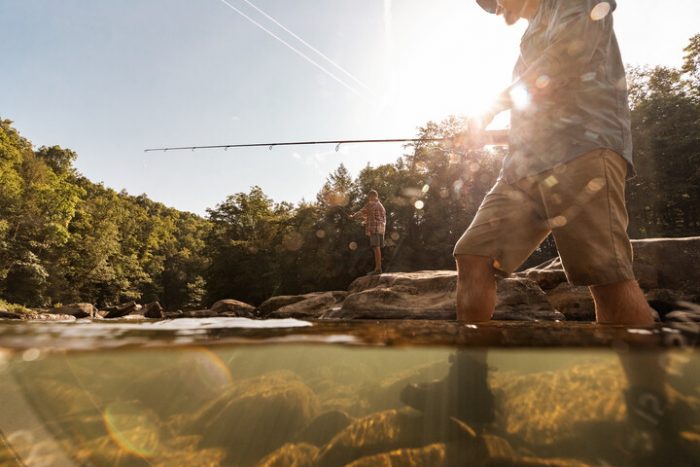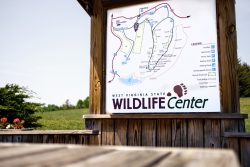Scientific Collecting Permits are required to handle or collect any species of wildlife on private or public lands in West Virginia for scientific or educational purposes, or for propagation. For permitting purposes, wildlife is defined as wild mammals, birds, fish, reptiles, amphibians, crustaceans, mollusks, and other forms of aquatic life. A permit is also required to collect plants from lands managed by the Division of Natural Resources.
West Virginia Scientific Collecting Permit Application Requirements
- The name of the person applying for the permit should be the first name listed on the top of the application form. The permit holder must be on-site when the surveys are being conducted. Any additional people who may be assisting the applicant must be listed also. If any subpermittee will be working on his/her own (i.e., the applicant will not be on-site during the surveys), then a separate permit is required.
- Clearly describe the purpose for which the specimens are to be collected or handled and attach a project proposal. The proposal must include a project description that outlines the need, expected outcome of the project, and any project products. Methodologies, survey techniques, and decontamination protocols must be described. If the project is long-term, include a project time line.
- Applicants requesting permits for the mistnetting/trapping of birds (and any subsequent banding) must have a specific project to justify the need for permit issuance (i.e., collaborative banding efforts [MAPS or Owlnet], banding in support of the specific conservation goals for state, regional, or national programs, academic research, recognized long-term banding projects, banding projects specifically tied to land management activities, or formal training classes which result in certification). The need to band or mark birds versus gathering observational data must be included in the project description, as well as methodologies, survey techniques, etc. A resume or CV and a copy of the applicant’s federal banding permit must be attached to the permit application. The WV Division of Natural Resources (WVDNR) will not allow permissions that are not listed in the federal permit (i.e., collecting blood, etc.).
- For permits requesting to handle federally threatened or endangered species, the West Virginia Scientific Collecting Permit will allow the permittee to handle the specified species under the WV Division of Natural Resources’ federal endangered species permit under Section 6 of the Endangered Species Act. Endangered species projects require written concurrence from the US Fish and Wildlife Service. The scientific collecting permit does not allow the taking (or the holding in captivity) of any federally threatened or endangered species, unless approved by the US Fish and Wildlife Service. All threatened and endangered animals must be released at the site of capture.
If working with Virginia big-eared bats (Corynorhinus townsendii virginianus), the permittee will be required to have holding cages approximately 11” x 7” x 8” in size. Virginia big-eared bats may not be placed in bags or small containers. - Be specific in specifying where the work will take place. Do not list counties without also listing the nearest town. Lists of coordinates without county and nearest town do not satisfy the survey site requirement. Providing a general location may prompt the need to ask for additional information to insure that rare, threatened and endangered species will not inadvertently be impacted. This can result in a delay in issuing the permit. Statewide permits can be issued for projects dealing with surveys for federally listed species and aquatic surveys; however, these permits will not be valid until project-specific information is supplied and permit addenda are issued. Other statewide permit requests will be assessed on a case-by-case basis.
- Sign and date the application, and attach any required fees (all fees are per permit application):Consultants: $200.00
Out-of-state academics/researchers/students: $25.00
In-state academics/researchers/students: No charge
Government agencies: No charge
Non-profit groups: No charge - A report must be submitted to the Scientific Collecting Permit Office (WVDNR, P.O. Box 67, 738 Ward Road, Elkins, WV 26241) within 45 days of the expiration date of the permit. Reporting forms or databases will be supplied by the WVDNR. Failure to submit a report can result in denial of future permits. Rare species records will become part of the statewide Natural Heritage Program Biotics database. All data will help the WVDNR manage the state’s natural resources. Copies of any reports or published papers resulting from your work in West Virginia are appreciated and will be placed in WVDNR files.
- If any federally threatened or endangered species is encountered, it must be reported within 48 hours (unless noted otherwise in permit provisions) to the US Fish and Wildlife Service and the WVDNR Endangered Species Biologist and the Scientific Collecting Permit Coordinator. Specific location data must be included.
- Permits will not be issued if the applicant does not show appropriate qualifications to conduct the work stated. This is particularly true for applicants requesting permits to work with federally listed species or bird banding. The applicant must provide a CV or resume which includes references, a list of publications, and other pertinent information.
- There may be restrictions placed on any Scientific Collecting Permit; therefore, it is important to read all permit provisions each year that a permit is issued. Failure to adhere to these provisions may result in the permit being revoked, denial of future permits, and/or legal action.
- Permit must be carried with the permittee while in the field; Natural Resources Police Officers or other WVDNR staff may request to see your permit.
- Scientific Collecting Permits do not give permission to access private property. Always contact landowners before entering private lands.
- Public land managers may require a collecting permit in addition to the Scientific Collecting Permit. Additional permits are required for state parks, state forests, state rail-trails, national forests, national wildlife refuges, and national parks/rivers/recreation areas if working on those lands.
- Scientific Collecting Permits are issued on a calendar year basis. If a project extends beyond December 31 of the current year, a new permit is required for the next calendar year.
- Permit holders may be requested to contact the district biologist and/or the district Natural Resources Police office before beginning work. Such requirements will be clearly stated on the permit.
- A permit addendum can be issued when changes to the project scope are not covered in the current permit. To request a permit addendum, all new information must be provided to the WVDNR. This new information may include counties (and nearest town), streams (and nearest town), species to be handled/collected, methodologies, expiration date, etc. If changes are related to a specific project, the project information must be provided as well. Lists of coordinates do not qualify as “location”. There is no charge for permit addenda.



